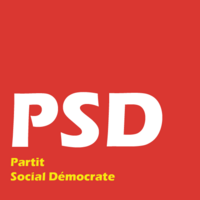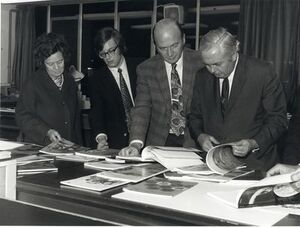Social Democratic Party (Midrasia)
Social Democratic Party Partit Social Démocrate | |
|---|---|
 | |
| Leader | Michel Leroux |
| Deputy Leader | Pierre Wire |
| Senate Leader | Patricia Bedoun |
| Founder | David Vorez |
| Founded | 1881 |
| Headquarters | Halgarde Building, Via Usine, Lotric |
| Ideology | Social Democracy Democratic Socialism |
| Political position | Centre-left |
| International affiliation | World Socialist Movement |
| Aeian Parliament | Socialist Union |
| Colours | Red |
| Public Assembly | 106 / 572
|
| Senate | 38 / 300
|
| Election symbol | |
| PSD | |
The Social Democratic Party (Midrasian: Partit Social Démocrate) is a social democratic political party in Midrasia. The party, led by Michel Leroux since 2017, is the third largest party within the Public Assembly and Senate, having formed the previous government under the leadership of Charles Vauban.
The PSD has governed at the highest level within Midrasia since the early twentieth century, becoming one of two major contemporary political parties, alongside the Republican Party. The party operates within all regions of Midrasia. The Social Democratic Party is the oldest Midrasian political party in terms of continuous operation, having contested every election since 1884.
History
Origins
The Social Democratic Party has its origins with the Midrasian Workers movement of the mid-1800s. Following the extension of voter franchise within the 1860s, many prominent trade unionists began pushing for the establishment of political parties aimed at representing the Midrasian working classes. Following a series of Workers riots and protests within the 1870s however, laws were introduced prohibiting Socialist parties from participating within Midrasian elections. Despite the ban, Socialist activists and independent MPs continued to operate underground, garnering sufficient support to earn 2 parliamentary seats within the Public Assembly in 1867.
Under the Radical government of Manuel Bedos in 1880-1884 the anti-Socialist laws were repealed allowing for Socialist parties to once again participate within Midrasian elections. At the Argois Conference of 1881, prominent trade unionists such as Max Colbert and David Vorez elected to form a new party aimed at widespread electoral appeal for the Midrasian socialist movement named the Social Democratic Party forming a successor to the original banned Socialist Worker's Party.
1881–1937
The party was immediately successful, gaining 29 seats within its first election in 1884. The outbreak of the Great War in 1895 however, damaged the party's electoral prospects, with the party condemning the war on ethical and political grounds. PSD party members, including party leader David Vorez were major contributors to the non-aligned movement during the war, opposing military conscription. Several party members were eventually arrested for their part in dodging the military draft, however were released following the conclusion of the war. Following Veleazan advances into eastern Midrasia however, several more moderate members of the party broke off from the non-aligned movement to support the war effort. With the end of the war, elections were rescheduled for late 1900, where the PSD performed adequately, forming a coalition with the larger Liberal League. Despite this, as the national mood changed following the aftermath of the war, the party gained considerable support, earning 54 seats in the 1905 election, along with their first Senatorial seat. By the late 1910s, the party had overtaken the Liberals to become the largest within the newly formed Reform Bloc.
The first PSD government in 1916 under Philippe Lavange followed a moderate line, appeasing their Liberal coalition partners. Despite this, the party was able to secure the nationalisation of several rail network with support from the Conservative Party, and legislation creating a minimum wage and maximum work hours. By 1920 however, the government collapsed, leading the Conservative Party to sweep the subsequent elections. Following this defeat, the PSD continued in opposition, gaining support from the declining Liberal League to secure its position as the second largest party in Midrasian politics. By 1924, the party once again won the Consulship under the leadership of Erwann Berthou. Although the first PSD government was able to introduce some key legislation, such as the 1936 Healthcare reforms, its time in government was cut short by the outbreak of the Bloody Month in 1937.
1937–1958
The outbreak of the Bloody Month in 1937 considerably decreased the popularity of the PSD. Many saw the government's inability to quickly suppress the uprising as a sign of the PSD's weakness; whilst others suggested members of the PSD had collaborated with Communist rebels, or at the very least held Communist sympathies. As such, the party lost over 100 seats within the 1937 election, losing out to the newly formed National Coalition Party. Under the new government, many members of the PSD were targeted as Communist sympathisers, with party leader Thierry Wyatt interrogated by the Committee for the Defence of the Republic. Several more radical members of the party, such as Jacques Viquere were arrested by the government for alleged communist sympathies. The public spotlight placed on the party by the committee and government alike saw the PSD reach an all-time low level of support. At the same time, entryists from the banned Communist Party attempted to infiltrate the PSD to garner support for a coup against the government.
By the late 1940s however support for the National Coalition was in decline due to the ongoing recession and an easing of international tensions, allowing the PSD to regain many of its lost seats in the 1953 election, where Patrice Magule was elected to the Consulship. Winning a further term in the 1957 elections.
1961–1973
under the leadership of Patrice Magule, the PSD enacted a series of incredibly popular policies, including the expansion of Midrasian Universities and the creation of polytechnic colleges to facilitate further education. The government also implemented measures to oversee the expansion of Health Insurance, laying the groundwork for the system seen today within modern Midrasia. Under the PSD's plans, the Midrasian health care system would become entirely publicly funded, although such reforms were reversed to an extent under the successive Republican governments of the 1970s and early 80s. Despite the successes of the Magule government, the PSD was unable to avert the economic crash of 1967, exacerbated by Midrasian industry's reliance on government subsidies and tariffs. Despite maintaining a minority government between 1969 and 1973, the PSD ultimately lost out in the 1973 election to the Republicans.
1973–2010
The PSD spent a total of 21 years in opposition following the UDA's electoral victory in 1973, during which time the government implemented an ambitious plan of privatisation and economic liberalisation. Throughout its time in opposition, the PSD underwent considerable change. Initially following the 1973 defeat, the party elected Henri Wooles, a hard-left candidate to the position of party leader. Under Wooles, the party developed an ambitious manifesto centred on widespread nationalisation and unilateral nuclear disarmament. This manifesto regarded as "far-left" by the nations media is widely blamed for the party's disastrous defeat in the 1977 election, leaving the party with only 97 seats. In the following years, the party pursued a more moderate line. Such policies allowed the PSD to form a small majority government in 1993, however economic mismanagement resulting in recession, plunged the party back into opposition in 2001. In their second opposition stint, the PSD implemented a series of reforms aimed at improving the party's electoral performance, most notably requiring any leadership candidate to command the support of at least 25% of the Parliamentary party to be placed on the electoral ballot.
2010–present
Since 2010 the party has undergone considerable transformation, moving away from its traditional Socialist origins, to embrace more centrist, or third way policies. Although many of these reforms began under the leadership of Manuel Pegrant it wasn't until the election of Charles Vauban to the position of party leader that Parliamentary Party truly committed to restructuring. There was a considerable debate within the party about its future direction following Pergrant's departure from leadership. Initially, the party had elected Marc Llalondec to the position in 2006. Lalondec, considered a moderate within the party, sought to balance the interests of both reformers and traditional left-leaning party members. However, following the party's defeat in the 2009 election, Lalondec's position was considerably weakened, leading to his resignation in early 2011. Following Vauban's election to party leader, the PSD underwent considerable re-branding, adopting new election symbols and remodelling its internal structure and media presence.
Despite this restructuring being popular with a large section of the parliamentary party and electorate, numerous party members and specifically trade unionists believed the party to be alienating its traditional support base with its new direction. The shift led to an exodus of left-wing party members to the Socialist Party, formed only a year before by disgruntled members protesting Vauban's election. Despite this large drop in membership, the party continued to perform well in the polls, going on to become the largest Midrasian party in parliament following the 2013 election and winning the Consulship with Vauban.
Under the Vauban government, the party has committed itself to investment into the Midrasian economy, specifically into disadvantaged areas such as Argois and Elsouf. Such investment has mainly focused on high-tech manufacturing and transportation links, such as an expansion of the Relier High-Speed Railway. Under Vauban, the Midrasian economy has continued to grow at a reasonable pace, aided by the expansion of the Aeian Community and greater trade links with neighbouring countries.
Nevertheless, the party's share of the collapsed in the 2017 election, mostly as a result of the various scandals which stained the Vauban administration. The party was only able to secure 98 seats in the Public Assembly and 38 in the Senate, relegating the party to the third largest in both houses. Nevertheless, the party was able to rebound during the 2019 mid-terms to secure 106 seats in the Public Assembly.
Ideology
Originally formed by trade unionists as a means of gaining political representation, the PSD has always been considered left of centre. Although within the party's early years there was a far clearer commitment to Socialism, with manifesto commitments to "common ownership" and greater "equality of outcome". The party has always favoured governmental intervention within economics and a redistribution of wealth. Much of this was to be carried out through Keynesian economic practices and higher taxation for the wealthy within society. The party has also consistently favoured greater rights for workers including maximum working hours and minimum wage laws. The PSD has held a commitment to the establishment of a welfare state and National Healthcare system, implementing numerous reforms throughout their time in government to expand and improve such institutions.
Despite this Socialist commitment in previous years, since the mid 1990s, the PSD has drifted more toward the political centre, embracing policies regarded as third way, with an acceptance of neoliberal economics. Such a transformation has damaged the party's relationship with trade unions, many of which disaffiliated to instead support the newly formed Socialist Party.
Electoral Performance
Parliament
| Election year | Public Assembly | Government | |||
|---|---|---|---|---|---|
| # of overall votes |
% of overall vote |
# of overall seats won |
+/– | ||
| 2013 | 21,489,250 | 26.9 % | 153 / 572
|
in coalition | |
| 2017 | 11,330,306 | 17.1 % | 98 / 572
|
in coalition | |
Aeian Parliament
| Election year | # of overall votes |
% of overall vote |
# of overall seats won |
+/– |
|---|---|---|---|---|
| 2016 | 4,661,034 | 29.1 % | 32 / 110
|


